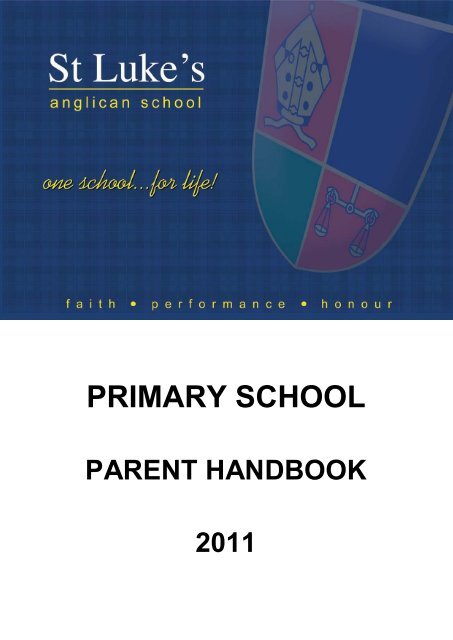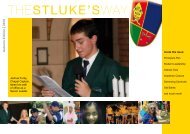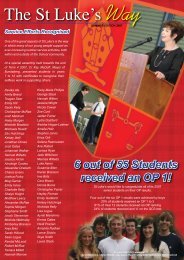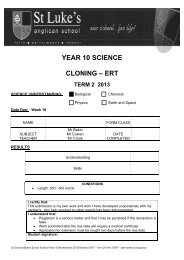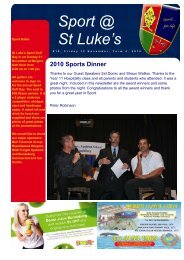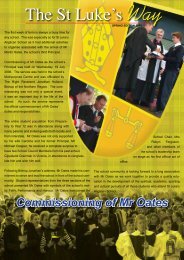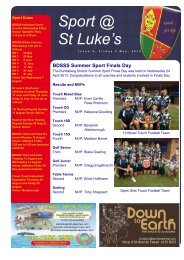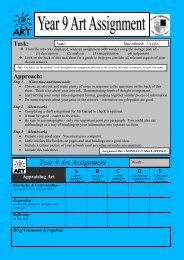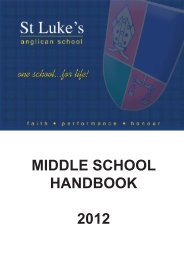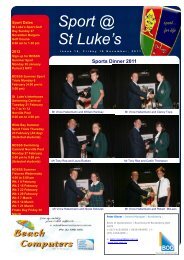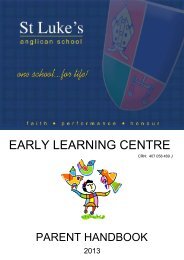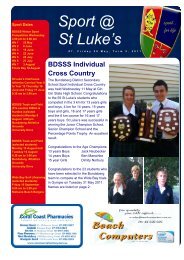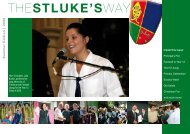PRIMARY SCHOOL - St Luke's Anglican School
PRIMARY SCHOOL - St Luke's Anglican School
PRIMARY SCHOOL - St Luke's Anglican School
Create successful ePaper yourself
Turn your PDF publications into a flip-book with our unique Google optimized e-Paper software.
<strong>PRIMARY</strong> <strong>SCHOOL</strong><br />
PARENT HANDBOOK<br />
2011
<strong>St</strong>aff 2<br />
The Aims of the Primary <strong>School</strong> 3<br />
Routines and Procedures 4<br />
Teaching Philosophy 4<br />
Hours and Attendance 4<br />
Bell Times 4<br />
Roll Marking 4<br />
<strong>St</strong>udent Absence 4<br />
Leaving <strong>School</strong> 4<br />
Lunch 4<br />
Tuckshop - Morning Tea and Lunch 5<br />
End of Day Procedure 5<br />
Bicycles 5<br />
Outside <strong>School</strong> Hours Care 6<br />
Uniform 7<br />
<strong>St</strong>udent Courtesy Policy 8<br />
<strong>St</strong>udent Welfare 8<br />
Behaviour Management 8<br />
Responsible Thinking Centre 10<br />
Worship and Assembly 12<br />
Pastoral Care 12<br />
Lost Property 12<br />
Newsletter 12<br />
Friday Afternoon Activities/Sport 12<br />
The Open Door Policy 13<br />
Health And Safety 14<br />
Sickness, Accidents And First Aid 14<br />
Medication 14<br />
Infectious Diseases 15<br />
Educational Programs 18<br />
Mathematics 18<br />
English 18<br />
Science 18<br />
<strong>St</strong>udies of Society and the Environment 19<br />
Languages Other Than English (LOTE) 19<br />
The Arts 19<br />
Year 3 <strong>St</strong>rings Program 19<br />
Physical Education And Sport 20<br />
Information Technology 20<br />
Religious Education 20<br />
The <strong>St</strong>udent Diary 20<br />
Communicating With Parents 21<br />
Differentiated Learning 21<br />
<strong>St</strong>udent Organisation 22<br />
<strong>St</strong>udent Reporting and Parent/Teacher Interviews 23<br />
Homework 24<br />
Co-curricular Activities 25<br />
Contents<br />
<strong>St</strong> Luke’s <strong>Anglican</strong> <strong>School</strong><br />
4 Mezger <strong>St</strong>reet, Bundaberg Q 4670<br />
Primary <strong>School</strong> Phone: 07 4132 7525<br />
Middle and Senior <strong>School</strong> Phone: 07 4132 7555<br />
Fax: 07 4132 7556<br />
stlukes@stlukes.qld.edu.au<br />
www.stlukes.qld.edu.au<br />
CRICOS: 01317D<br />
1
Principal<br />
Head of Primary <strong>School</strong><br />
Head of Campus<br />
Head of Middle <strong>School</strong> and Curriculum<br />
Director of Marketing and Development<br />
Chaplain<br />
Business Manager<br />
Operations Manager<br />
Assistant to the Principal<br />
Assistant to the Head of Primary<br />
Assistant to Head of Campus and Head of Middle <strong>School</strong><br />
Mr Martin Oates<br />
Mr Allan Davison<br />
Mr David Eke<br />
Mr Nick Johnstone<br />
Mr Craig Corpe<br />
Rev’d Andrew Schmidt<br />
Mr Phillip Hinds<br />
Mr Trevor Jacobsen<br />
Mrs Phyllis Asmus<br />
Mrs Leonie Boreel<br />
Mrs Sarah Lawson<br />
Early Learning Centre<br />
Mrs Nora Johnstone (Director/Pre-prep Teacher)<br />
Mr <strong>St</strong>even McKay (Pre-prep Teacher)<br />
Mrs Karen Scutts (Kindergarten Group Leader)<br />
Mrs Lena Busby (Early Learning Centre Assistant / Adminstration)<br />
Mrs Janine Lawrence (Early Learning Centre Assistant/Group Leader)<br />
Mrs Cheryle Betts (Early Learning Centre Assistant)<br />
Mrs Robyn Dinsey (Early Learning Centre Assistant)<br />
Mrs Wendy Gillard (Early Learning Centre Assistant)<br />
Ms Renee Watson (Early Learning Centre Assistant)<br />
<strong>St</strong>aff<br />
Primary<br />
Prep R<br />
Prep W<br />
Year 1B<br />
Year 1J<br />
Year 2G<br />
Year 2K<br />
Year 3H<br />
Year 3B<br />
Year 4W<br />
Year 4H<br />
Year 5S<br />
Year 5J<br />
Year 6C<br />
Year 6F<br />
Mrs Cathie Robinson (Mrs Trudi Zormann - Assistant)<br />
Mrs Megan Warren (Ms Christine Modolo - Assistant)<br />
Mrs Elizabeth Bester<br />
Mrs Jane Bridges<br />
Miss Holly Gatley<br />
Mrs Karyn Gordon<br />
Mrs Karla Hayhoe<br />
Mr Christopher Bigg<br />
Mrs Carol Wright<br />
Mrs Kellie Hansen<br />
Mr Ian Sinclair<br />
Mrs Vickie Jacobsen<br />
Mr Matthew Cathcart<br />
Mr Matthew Farthing<br />
Head of Differentiated Learning<br />
Learning Support<br />
Primary Receptionists<br />
Primary Teacher Aides<br />
Differentiated Learning Assistants<br />
Mrs Christa <strong>St</strong>one<br />
Mrs Alison Haimes<br />
Mrs Kerry Kennedy and Mrs Linda Marsh<br />
Mrs Alison Pukallus, Mrs Kim Royan and<br />
Mrs Neridah Peterson, Mrs Davina Johnson<br />
Mrs Leeann Evans, Mrs Corrine Myers and<br />
Mr Sid Domic<br />
Specialist Teachers<br />
Physical Education<br />
Music<br />
Japanese<br />
German<br />
Library<br />
Year 3 <strong>St</strong>rings<br />
Mrs Maryann Baren<br />
Mrs Mary Maclean / Mrs Leanne Hutchings<br />
Mr Nicholas Crook, Mr Matthew McKenzie<br />
Herr Ron Preuss, Mrs Jane McRae<br />
Mrs Darlene Hill<br />
Mrs Amanda Roche<br />
2
THE AIMS OF THE <strong>PRIMARY</strong> <strong>SCHOOL</strong><br />
The <strong>St</strong> Luke’s <strong>Anglican</strong> <strong>School</strong> Primary <strong>School</strong> encourages children to believe in<br />
themselves and asks that they always give their best to tasks. The <strong>School</strong> seeks<br />
to foster a positive and realistic self-concept, providing children with opportunities<br />
to develop informed opinions about the values operating in our society. The need<br />
for respect and tolerance of people, cultures and ideas is encouraged. Activities will<br />
foster self-awareness by stimulating children to cooperate, share and understand<br />
cause and effect.<br />
The <strong>School</strong> strives to create and maintain a caring and safe environment, which relies<br />
on positive interaction to promote the well being of each individual and group. Risk<br />
taking is encouraged and accepted as an integral part of confidence and competence.<br />
Children flourish in a welcoming and warm, emotional and social environment where<br />
the individual is highly valued and sees him/herself as a unique and worthwhile<br />
person. Such a learning environment fosters freedom of expression and respect for<br />
the opinion of others. It helps children to make their own decisions, to do what they<br />
believe to be right, while respecting the rights of others.<br />
Curricular, resource selection and implementation of learning programs:<br />
• are child centred and teacher guided<br />
• are gender inclusive<br />
• are focused on the whole child<br />
• reflect the needs of the individual child<br />
• are non-discriminatory.<br />
The <strong>St</strong> Luke’s Primary <strong>School</strong> is a happy working environment where staff are<br />
supportive of each other and work in a collaborative manner. The <strong>School</strong> and staff are<br />
committed to on-going professional development. Cohesive team-work is encouraged<br />
so that all staff feel fulfilled in their varying roles within the <strong>School</strong>, practise effective<br />
communication with the <strong>School</strong> community and develop a mutual feeling of support<br />
and respect.<br />
The <strong>St</strong> Luke’s Primary <strong>School</strong> promotes harmony and involvement between children,<br />
parents, staff and community as integral members of a partnership in education.<br />
All parents are encouraged to participate in the development and maintenance of<br />
community relationships with the <strong>School</strong> as the focus. It is hoped that all parents<br />
recognise the need for their involvement and support of the <strong>School</strong>. Such support has<br />
a positive effect on their children and is greatly appreciated by the <strong>School</strong>.<br />
The Aims of the Primary <strong>School</strong><br />
3
TEACHING PHILOSOPHY<br />
<strong>St</strong> Luke’s Primary <strong>School</strong>, while adopting a wide range of teaching strategies and<br />
practice, is dedicated to a policy of developmental teaching. In essence, this means<br />
that all teaching is aimed at meeting the unique abilities and interests of every student.<br />
To this end, classrooms will be characterised by student initiative and choice, optimum<br />
student participation, warmth and success.<br />
Routines and Procedures<br />
HOURS OF ATTENDANCE<br />
Kindergarten<br />
Pre-Prep<br />
Preparatory<br />
Years 1 – 6<br />
BELL TIMES<br />
7.30 am – 5.30 pm<br />
9.00 am – 3.00 pm<br />
8.30 am – 3.00 pm<br />
8.30 am – 3.00 pm<br />
Preparatory Years 1 to 6<br />
Morning Session 8.30 am to 10.20 am 8.30 am to 10.20 am<br />
Morning tea 10.20 am to 10.40 am 10.20 am to 10.40 am<br />
Middle Session 10.40 am to 1.05 pm 10.40 am to 1.05 pm<br />
Lunch 1.05 pm to 1.50 pm 1.05 pm to 1.50 pm<br />
Afternoon Session 1.50 pm to 3.00 pm 1.50 pm to 3.00 pm<br />
ROLL MARKING<br />
Rolls and absentee sheets are marked by the class teacher. Parents are asked to<br />
ensure that their children are always on time for the start of <strong>School</strong>. If your child is<br />
late to <strong>School</strong> please ensure that you inform Primary Administration of their arrival.<br />
If parents have not contacted the <strong>School</strong> regarding their child’s absence on a certain<br />
day, they will be contacted so that the child’s whereabouts is known.<br />
STUDENT ABSENCE<br />
Parents of students who will be away from school on any given day should ring the<br />
<strong>School</strong> before 8.30 am so that we can account for all students.<br />
LEAVING <strong>SCHOOL</strong><br />
Children are not permitted to leave the <strong>School</strong> grounds during the day without a<br />
parent or without the parent’s permission. Should a child need collecting during the<br />
normal school day, parents are asked to sign their child out and, on the child’s return,<br />
sign the child in. This is done at the Primary Administration Office.<br />
LUNCH<br />
All students eat lunch under the supervision of staff on duty. At all times students<br />
must be seated with rubbish being put into bins after the end of the lunch eating bell.<br />
Teachers on duty check the lunch boxes of the students in Preparatory to Year 1 to<br />
ensure that the appropriate amount of lunch has been eaten.<br />
4
<strong>St</strong>udents must not share food or throw large amounts of food away. If lunches cannot<br />
be eaten, the remaining lunch should be put back into the lunch box to allow you to<br />
gauge what food your child has eaten.<br />
TUCKSHOP - MORNING TEA AND LUNCH<br />
The tuckshop is open at morning tea and lunch each day of the week. Tuckshop<br />
monitors will collect order baskets from classrooms at the beginning of the <strong>School</strong><br />
day. The monitors will then bring the basket back to your room at the beginning of<br />
morning tea and lunch.<br />
Morning tea and lunch are to be ordered at the beginning of the day by placing the<br />
correct money in a paper bag and writing the following information on the front. The<br />
information on the front of the bag should include:<br />
• student’s name and class, eg 3W<br />
• whether it is a morning tea or lunch order<br />
• the actual order.<br />
The paper bag is then placed into the class tuckshop basket.<br />
After eating lunch, students are free to go to the tuckshop to buy extra snack food.<br />
This is not to be an opportunity to purchase lunch. This should be done through lunch<br />
orders.<br />
The tuckshop is out of bounds at all other times.<br />
END OF DAY PROCEDURE<br />
The day will conclude at 3.00 pm for all students. Parents may pick up their children<br />
from the classroom at 3.00 pm.<br />
After dismissing the students at 3.00 pm, a teacher will be on duty at both the<br />
Upper and Lower Primary <strong>School</strong> car parks where Primary <strong>School</strong> students wait for<br />
collection. At 3.30 pm the car park duty teacher will take any remaining students to<br />
the after school care facility where they will wait for their parents to collect them. If<br />
students use the after school care facility, parents will be charged for this service.<br />
All students catching buses will need to move to the main car park. All students must<br />
go home in full school uniform.<br />
BICYCLES<br />
<strong>St</strong>udents riding bicycles to <strong>School</strong> are the responsibility of parents. The age of<br />
children, the distance to be covered and the path to be taken should be taken into<br />
account before a child undertakes this activity. The <strong>School</strong> is to be informed of any<br />
students who ride a bike to <strong>School</strong>.<br />
Routines and Procedures<br />
<strong>St</strong>udents who travel to <strong>School</strong> by bicycle must wear the approved safety equipment<br />
and bicycles must be in roadworthy condition. <strong>St</strong>udents not fulfilling the safety<br />
5
equirements will not be allowed to travel by bicycle until these requirements are met.<br />
<strong>St</strong>udents traveling by bicycle must wear full school uniform except for the <strong>School</strong> hat.<br />
<strong>St</strong>udents may wear their sports cap under their helmet.<br />
Routines and Procedures<br />
Bicycles should be locked in the bicycle areas. These areas are out of bounds during<br />
the day. The <strong>School</strong> does not accept responsibility for loss or damage to bicycles. For<br />
the safety of all children bicycles are not to be ridden in the school playground at any<br />
time.<br />
OUTSIDE <strong>SCHOOL</strong> HOURS CARE<br />
Children making use of the Out of <strong>School</strong> Hours Care facility, whether it be a regular<br />
or casual basis, must register and complete emergency contact details.<br />
Before <strong>School</strong> Care<br />
The before school care session starts at 7.30 am. Unless involved in supervised cocurricular<br />
activities, Preparatory students who arrive at school between 7.30 am and<br />
8.00 am must go to before school care in the Early Learning Centre. <strong>St</strong>udents will be<br />
escorted to classrooms between 8:15 and 8.30 am by a staff member.<br />
After <strong>School</strong> Care<br />
After school care starts at 3.00 pm. Unless involved in afternoon supervised cocurricular<br />
activities, students should meet the After <strong>School</strong> Care Coordinator under<br />
the Primary Sails once being dismissed from class. The roll will be marked at this time.<br />
The children will then be escorted to the Kindergarten facility to commence homework<br />
and other organised activities.<br />
<strong>St</strong>udents who have not been collected from the car park area by 3.30 pm will need<br />
to be brought back to the After <strong>School</strong> Care facility by the teacher on car park duty.<br />
Parents will have to collect their children from this facility.<br />
NB: Regardless of the length of time your child attends, the morning or afternoon rate<br />
will be charged. No part session fees apply.<br />
Please note that a late fee of $10.00 per 15 minutes will be charged for children not<br />
collected by 5.30 pm.<br />
The cost of this facility is available on request from the Early Learning Centre<br />
Administration.<br />
Before <strong>School</strong> Care<br />
Morning Session 7.30 – 8.30 am<br />
After <strong>School</strong> Care<br />
Full session 3.00 – 5.30 pm<br />
6
UNIFORM<br />
1.The school uniform is worn on all school occasions, (including excursions, unless<br />
it is deemed that the sports uniform is more appropriate for the activity). The uniform<br />
should be worn totally and correctly. Hats must be worn at all times while not in the<br />
classroom or the Multipurpose Purpose Centre. All other locations including verandas<br />
and shaded areas require the hat to be worn.<br />
2. Shoes must be black leather lace up which must be maintained in a clean and<br />
polished condition. The <strong>School</strong> navy socks with green bands are to be worn with the<br />
formal uniform. Girls are permitted to wear plain navy tights. Ribbed or patterned<br />
tights are not permitted to be worn.<br />
The polar fleece <strong>School</strong> jumper may be worn by students in Preparatory to Year 6.<br />
The Primary <strong>School</strong> tracksuit pants maybe worn during the cooler months. Primary<br />
students may wear the track suit top over the polar fleece jumper; however, they are<br />
not be worn as the only jumper.<br />
3. Girls can wear a small, plain pair of sleepers or studs (gold or silver only) of even<br />
thickness (to be worn in the lowest holes in the ear lobes). A counter display of<br />
jewellery conforming to this policy is available for perusal (to gauge size conformity<br />
and colour) or for purchase at the <strong>School</strong> Uniform Shop. No additional ear jewellery<br />
is allowed to be worn. Boys are not permitted to wear ear jewellery of any kind.<br />
<strong>St</strong>udents not conforming to policy will be asked to remove the item/s or in the case<br />
of multiple infringements have the item/s confiscated.<br />
A discretely worn religious cross and a watch, conservative in style and colour, may<br />
be worn. No other jewellery is to be worn.<br />
4. Hairstyle is an adjunct to uniform. Boys’ hair must be maintained above the collar.<br />
<strong>St</strong>yles may be modern; however, shaved or tracked styles along with crew cuts, ridge<br />
cuts, rats’ tails and long hairstyles are not accepted. Girls’ hair must be fully tied back<br />
when close to shoulder length or longer. Fringes must not be able to fall forward into<br />
eyes. Girls hair accessories (including ribbons, elastic bands, hair clips and ties)<br />
must be navy blue, green, school tartan or black. A plain white ribbon may also be<br />
used to tie hair back.<br />
5. Hair is to be of the child’s natural colour. Dying of a child’s hair is not acceptable.<br />
6. When students are changing they should do so during the breaks (ie before<br />
<strong>School</strong>, morning tea, lunch). For example, if the Physical Education lesson is during<br />
the morning session, students should change before <strong>School</strong> and then change back<br />
at morning tea. Preparatory, Years 1 and 2 students wear their sports uniform to and<br />
from <strong>School</strong> on their PE/sports days.<br />
Routines and Procedures<br />
7. All items of clothing should be clearly named.<br />
8. <strong>St</strong>udents wearing uniforms around town need to be in full uniform. The <strong>School</strong>’s<br />
uniform should be worn correctly at all times. It demonstrates pride in the <strong>School</strong> and<br />
the standards set by the <strong>School</strong>.<br />
7
The Sport Uniform<br />
All students in the Primary <strong>School</strong> will need to wear sports uniform (house {coloured}<br />
shirt) for Physical Education lessons. <strong>St</strong>udents in Preparatory to Year 2 wear their<br />
sports uniform (house shirt) to and from <strong>School</strong> for Physical Education. <strong>St</strong>udents in<br />
Years 3 to 6 will need to change into sports uniform (house shirt) for Physical Education<br />
and back into formal uniform before leaving the <strong>School</strong>.<br />
Routines and Procedures<br />
For Friday sport/activities, students in Years 1 to 3 wear their sports uniform (house<br />
shirt) to and from <strong>School</strong>. <strong>St</strong>udents in Years 4 to 6 wear their sports uniform (<strong>School</strong><br />
sports shirt) to and from <strong>School</strong>.<br />
<strong>St</strong>udents are permitted to wear the Secondary <strong>School</strong> tracksuit but only when in sports<br />
uniform.<br />
Note: This uniform policy applies to students from Preparatory to Year 6 only. <strong>St</strong>udents<br />
unable to wear the correct uniform should bring a note for the class or PE teacher.<br />
STUDENT COURTESY POLICY<br />
The standards expected of our students must be exemplary. One of the most important<br />
ways that a <strong>St</strong> Luke’s student can ‘stand out’ is through courtesy.<br />
These procedures are to be followed at all times.<br />
1. On all occasions, in the classroom or outside, a student is to refer to a member of<br />
staff by “Sir, Mrs / Miss” or by their name. This applies to all interactions. “Yes” is<br />
not acceptable. The response will be “Yes, Sir” or “No, Miss” or “Yes, Mrs Brown”.<br />
2. <strong>St</strong>udents are to stand when a teacher or adult visitor enters a room.<br />
3. <strong>St</strong>udents are to stand back from a door to let an adult in or out first.<br />
4. Preparatory to Year 6 students must travel through the <strong>School</strong> in two lines.<br />
Courtesy should be a mark of a <strong>St</strong> Luke’s student around Bundaberg.<br />
STUDENT WELFARE<br />
Bullying exists in many different forms - physical, mental, verbal or emotional.<br />
Bullying can lead to permanent emotional disturbance or worse. The <strong>School</strong> would<br />
recognise a student’s welfare was at risk if a student felt that he/she was being<br />
subjected to bullying of any nature.<br />
It is, therefore, the intention of the whole <strong>School</strong> community that we do our utmost<br />
to minimise bullying in its many forms. <strong>St</strong> Luke’s <strong>Anglican</strong> <strong>School</strong> encourages an<br />
environment that allows the whole community to feel safe, secure and cared for.<br />
BEHAVIOUR MANAGEMENT<br />
The <strong>School</strong> respects the basic values of the home and promotes socially acceptable<br />
behaviour based on the fundamental principles of: the right to learn/teach without<br />
disruption; care and consideration for each other; care of the environment and<br />
8
property; and the right to feel happy and safe at all times.<br />
The <strong>School</strong> has a Behaviour Management Policy, which states that children are<br />
responsible for their own behaviour. The policy outlines various steps through which<br />
a child progresses, depending on the type of misbehaviour.<br />
Communication with parents is always made when the child’s behaviour indicates<br />
that this is necessary. Parents are requested to inform the teacher or Head of<br />
Primary when a child’s school work or behaviour might be affected in some way by<br />
circumstances not known to the <strong>School</strong> (serious illness in family, separation and so<br />
on).<br />
Routines and Procedures<br />
9
RESPONSIBLE THINKING CENTRE (RTC)<br />
Purpose<br />
Routines and Procedures<br />
To enable teachers to request a lunch-time withdrawal for children who have repeatedly<br />
performed misdemeanours and for incidents of fighting/bullying or dangerous<br />
behaviours in the playground before and after <strong>School</strong> or for not completing work in<br />
class or homework.<br />
Procedures<br />
• the RTC will operate every day of the week for the second half of the lunch session;<br />
• one classroom from Years 4, 5 or 6 will be utilised with 1 teacher supervising the<br />
second half of lunch;<br />
• teachers will inform the parents of a child’s detention through student diaries;<br />
• records will be kept in the Primary Office regarding name, reason for removal from<br />
lunch play and what the child is to do (behaviour plan, homework etc);<br />
• a Friday afternoon detention will be given to students who have visited the RTC<br />
for behavioural reasons 3 times in the week or for visiting the RTC 4 times within<br />
a term;<br />
• If a child visits the RTC room for five or more times in a term, the parents will be<br />
contacted and an interview regarding the child’s behaviour will be held.<br />
Blue Spots – Good Behaviour<br />
Children will be rewarded with a blue spot sticker for exceptionally good behaviour/<br />
work performance. The spot will be placed into the child’s diary along with a brief<br />
comment and signature from the teacher.<br />
Upon receiving 10 spots in the term, the child will receive an achievement certificate<br />
on Assembly in recognition of their excellent behaviour.<br />
Red Spots – Inappropriate Behaviour<br />
Children receive a red spot sticker, comment and signature in their diary for any<br />
inappropriate behaviour/misdemeanour.<br />
Children who receive 4 red spots in a week will be given a lunch time detention at the<br />
RTC.<br />
10
STUDENT RESPONSIBILITIES<br />
The development of responsible behaviour in the Primary <strong>School</strong> is considered<br />
essential in the development of self-esteem and confidence. Teachers should take<br />
advantage of many areas that expose the students to undertaking roles of responsibility<br />
both in and out of class.<br />
There are a number of different levels of responsibility open to students in the Primary<br />
<strong>School</strong>. During a child’s time at <strong>St</strong> Luke’s, it is hoped that all children will be given the<br />
opportunity to experience these different levels of responsibility. These levels may<br />
include:<br />
1. Activity Monitors/Helpers: <strong>St</strong>udents can be provided a range of opportunities<br />
during class activities and group work. Roles including recorder, presenter, buddy,<br />
peer tutor, etc provide students with valuable group responsibility skills.<br />
2. Classroom Monitors: Daily/Weekly tasks provide students with opportunities to be<br />
responsible for the maintenance of the classroom on which the effectiveness of<br />
the whole class depends.<br />
3. A responsibility given to students in Year 3 involves:<br />
• raising/lowering the flag<br />
• assist the Head of Primary with assembly<br />
4. Year 6 Monitors: Year 6 students will be involved in undertaking tasks that assist<br />
in the effective operation of the Primary <strong>School</strong>. These children will receive public<br />
recognition for undertaking these tasks which could include:<br />
• assisting the Head of Primary with assembly<br />
• lost property<br />
• playground help<br />
Children assist in these tasks on a rotational basis.<br />
5. House Leaders: These children will assist with any academic, cultural or service<br />
house activity.<br />
6. Chapel Leaders: Two or three Year 6 students are chosen as Chapel Leaders each<br />
semester. These students assist the <strong>School</strong> Chaplain during Primary Worship and<br />
school liturgies.<br />
Routines and Procedures<br />
11
WORSHIP AND ASSEMBLY<br />
Routines and Procedures<br />
Each class attends one service and one formal assembly each week. Worship is<br />
conducted by the Chaplain, and students are encouraged to be active in their worship.<br />
Many of the assemblies are planned and conducted by the children. Assemblies feature<br />
group singing, reports from children, displays of work and general announcements.<br />
All children attend as regular school gatherings create a cohesive school community<br />
and maintain a heightened school spirit. Parents are welcome to attend.<br />
PASTORAL CARE<br />
Pastoral Care lessons are held once a week for students who are in Years 1 to 6<br />
and provides an opportunity for children to develop as an individual with a focus on<br />
self-esteem, social skills and mental health. The students from Years 1 to 6 may be<br />
vertically streamed for sections of their Pastoral Care lessons.<br />
LOST PROPERTY<br />
Lost property is located in a box outside the Primary Teacher Assistants’ Room. A<br />
second container is located in Upper Primary in the Year 5S classroom. Children are<br />
encouraged to check this bin regularly. Unclaimed lost property is donated to charity<br />
at the end of each term.<br />
All items of clothing should be labelled so that lost property can be returned promptly,<br />
avoiding unnecessary expense for parents.<br />
NEWSLETTER<br />
As a frequent form of communication with parents, the newsletters are very important<br />
publications. The Primary Pipeline features items of news, important dates, awards<br />
and other interesting and informative articles. This is published every second Friday.<br />
The whole of school newsletter, Life @ <strong>St</strong> Luke’s, contains information about full<br />
school activities and is also published once a fortnight, on the alternate Friday from<br />
the Pipeline.<br />
In an effort to promote responsible environmental practices, these newsletters are<br />
preferably distributed via email, so we would appreciate you updating the <strong>School</strong> of<br />
any changes to your email address.<br />
FRIDAY AFTERNOON ACTIVITIES / SPORT<br />
There are two sessions of Friday Activities<br />
Years 1 - 3<br />
afternoon session<br />
Years 4 – 6 afternoon session<br />
12
THE OPEN DOOR POLICY<br />
The Primary <strong>School</strong> has an open door policy for parents. This means that parents<br />
of students in Preparatory to Year 6 have access to their child’s classroom every<br />
morning from 8.15 am.<br />
Parents gain the greatest insight into their child’s education by actually being a<br />
part of the learning process. This policy allows for this to happen and, as a result,<br />
we recommend it to you. The open door policy also plays a big part in offering our<br />
students the best developmental program possible.<br />
It is envisaged that parents taking advantage of this opportunity do so with the aim<br />
of helping students in the class. The open door policy is an effective educational<br />
tool. The parent’s role is to assist the class teacher in activities such as listening to<br />
reading, making simple teaching resources and helping with “busy” activities such as<br />
Art or Science.<br />
Routine and Procedures<br />
13
SICKNESS, ACCIDENT FIRST AID<br />
Information of a child’s health status (eg epilepsy, diabetes) should be provided at<br />
enrolment. If this information needs updating due to changed circumstances, it is<br />
most important that the new information is provided to the <strong>School</strong>.<br />
Health and Safety<br />
For their own comfort, as well as the comfort of other children, sick children should<br />
be kept at home. Should a child become ill at school or has an accident he/she will<br />
be cared for and parents will be contacted to make arrangements for the child to go<br />
home. If a child suffers a serious accident necessitating emergency medical care, he/<br />
she will be transported by ambulance to hospital or taken to a doctor. A staff member<br />
with First Aid qualifications will render initial treatment.<br />
MEDICATION<br />
Paracetamol is kept at the Primary Administration Office and may be administered to<br />
students should this be seen as necessary. Prior to administering the paracetamol, the<br />
student’s file will be checked to ensure that the parents have given authority for this.<br />
Where the file does not indicate that the parents’ approval has been given in advance,<br />
paracetamol will not be administered. Please ensure that your child’s records are kept<br />
up to date.<br />
<strong>St</strong>udents who have a chronic condition, such as diabetes or asthma or have an<br />
allergic reaction to stings or specific foods, are required to have a Medical Action/<br />
Management plan to be attached to the student’s file. It is advisable for students to<br />
carry their own glucose or Ventolin in the original container, marked with the student’s<br />
name and with the pharmacist’s instructions clearly shown. <strong>St</strong>udents who have the<br />
potential to anaphylaxis should have an EpiPen in the classroom which should be<br />
taken with them when leaving the classroom.<br />
Reception staff will hold medication on a student’s behalf provided it is in the original<br />
container, marked with the student’s name and with the pharmacist’s instructions<br />
clearly shown and a Record of Administation of Medication form has been completed<br />
at the Primary Office. Every endeavour will be made to ensure that the medication is<br />
administered at the times specified on the container. Out of date medication will not<br />
be administered.<br />
14
Infectious Diseases Exclusion from <strong>School</strong><br />
The Health Authority supplies the following information regarding exclusion from<br />
school for the more common communicable childhood diseases –<br />
Disease Exclusion of Case (person with<br />
infection)<br />
Chicken Pox<br />
Exclude until all blisters have dried.<br />
Usually at least 5 days after the rash first<br />
appeared in un-immunised children and<br />
less in immunised children.<br />
Cold Sores<br />
Conjunctivitis<br />
Young children unable to comply with good<br />
hygiene practices should be excluded<br />
while sores are weeping. (Sores should be<br />
covered with a dressing where possible).<br />
Exclude until discharge from eyes has<br />
ceased unless non-infectious conjunctivitis.<br />
Exclusion of Contacts 1 (person exposed to<br />
the case with infection)<br />
Any child with an immune deficiency (ie<br />
leukaemia) or receiving chemotherapy or<br />
immunosuppressive therapy may require<br />
preventive immunoglobulin and/or exclusion for<br />
their own protection. Otherwise not excluded.<br />
Not excluded.<br />
Not excluded.<br />
Cytomegalovirus (CMV) Exclusion not necessary. Not excluded.<br />
Diarrhoea 2 (including<br />
amoebiasis, campylobacter,<br />
cryptosporidium, giardia,<br />
rotavirus, salmonella, shigella<br />
and viral gastroenteritis, but<br />
not norovirus - see separate<br />
section)<br />
Exclude until there has not been a loose<br />
bowel motion for 24 hours.<br />
Exclude staff whose work involves food<br />
handling until they have not had any<br />
diarrhoea or vomiting for 48 hours.<br />
If there are more than 2 cases with loose<br />
bowel motions in the same centre or a<br />
single case in a food handler, notify your<br />
nearest Population Health Unit.<br />
Not excluded.<br />
Diphtheria 3<br />
Enterovirus 71 (EV71)<br />
Neurological Disease<br />
Glandular Fever<br />
(Epstein-Barr virus (EBV),<br />
mononucleosis)<br />
Haemophilius influenza type<br />
B (Hib)<br />
Exclude according to Population Health<br />
Unit requirements<br />
Written medical clearance is required<br />
confirming the virus is no longer present in<br />
the child’s bowel motions.<br />
Exclusion is not necessary.<br />
Exclude until child has received appropriate<br />
antibiotic 4 treatment for at least 2 days.<br />
Written medical clearance from doctor or<br />
Population Health Unit is required to return<br />
to child care or school, confirming child is<br />
not infectious. 5<br />
Excluded. All contacts (regardless of their<br />
vaccination status) should have nose and throat<br />
swabs taken, receive prompt antimicrobial<br />
prophylaxis and be examined daily for 7 days<br />
for evidence of disease.<br />
Not excluded.<br />
Not excluded.<br />
Not excluded.<br />
Hand foot and mouth Exclude until all blisters have dried. Not excluded.<br />
Head Lice<br />
Exclusion is not necessary if effective Not excluded.<br />
treatment is commenced prior to the next<br />
attendance day (ie the child does not<br />
need to be sent home immediately if lice<br />
is detected).<br />
Hepatitis A 3<br />
Exclude until at least 7 days after the onset Not excluded.<br />
of jaundice or illness. Written medical<br />
clearance from doctor or Population Health<br />
Unit is required to return to child care or<br />
school, confirming child is not infectious.<br />
Hepatitis B Exclusion not necessary. Not excluded.<br />
Hepatitis C Exclusion not necessary. Not excluded.<br />
Human immunodeficiency Exclusion not necessary.<br />
Not excluded.<br />
virus (HIV/AIDS)<br />
Influenza and influenza-like<br />
illness<br />
Exclude until well.<br />
Not excluded.<br />
Health and Safety<br />
15
Health and Safety<br />
Disease Exclusion of Case (person with<br />
infection)<br />
Measles 3<br />
Exclude until at least 4 days since the<br />
onset of rash. Written medical clearance<br />
from doctor or Population Health Unit is<br />
required to return child to care or school,<br />
confirming child is not infectious. 5<br />
Meningitis (bacterial)<br />
Exclude until well and has received Not excluded.<br />
appropriate antibiotics. 4<br />
Meningitis (viral) Exclude until well. Not excluded.<br />
Meningococcal infection 3 Exclude until child is well and has received Not excluded.<br />
appropriate antibiotics. 6 Written medical<br />
clearance from doctor or Population Health<br />
Unit is required to return child to care or<br />
school, confirming child is not infectious. 5<br />
Molluscum Contagiosum Exclusion is not necessary. Not excluded.<br />
Mumps Exclude for 9 days after onset of swelling. Not excluded.<br />
Norovirus<br />
Exclude until there has not been a loose Not excluded<br />
diarrhoea or vomiting for 48 hours.<br />
Parvovirus (erythema<br />
infectiosum, fifth disease,<br />
slapped cheek syndrome)<br />
Exclusion not necessary.<br />
Not excluded.<br />
Pertussis 3 (whopping cough)<br />
Poliomyelitis 3<br />
Ringworm/tinea/scabies<br />
Roseola (sometimes referred<br />
to as ‘baby measles’)<br />
Rubella (German Measles) 3<br />
Exclude until child has received 5 days of<br />
appropriate antibiotics 4 or for 21 days from<br />
the onset of coughing. Written medical<br />
clearance from doctor or Population Health<br />
Unit is required to return child to care or<br />
school, confirming child is not infectious. 5<br />
Exclude for at least 14 days from onset<br />
of symptoms and case has recovered.<br />
Written medical clearance from doctor or<br />
Population Health Unit is required to return<br />
child to care or school, confirming child is<br />
not infectious. 5<br />
Exclude until the day after appropriate<br />
treatment has commenced.<br />
Exclusion not necessary.<br />
Exclude until fully recovered or for at least<br />
4 days after the onset of rash.<br />
<strong>School</strong> Sores (impetigo) Exclude until appropriate antibiotic 4<br />
treatment has commenced (sores on<br />
exposed areas must be covered with a<br />
watertight dressing).<br />
<strong>St</strong>reptococcal sore throat<br />
(including scarlet fever)<br />
Exclude until well and has received<br />
antibiotic 4 treatment for at last 24 hours.<br />
Exclusion of Contacts 1 (person exposed to<br />
the case with infection)<br />
Immunised and immune contacts not excluded.<br />
Un-immunised contacts of a case are to be<br />
excluded until 14 days after the first day of<br />
appearance of rash in the last case, unless<br />
immunised within 72 hours, or receive an<br />
immunoglobulin injection within 7 days, of first<br />
contact during the infectious period with the<br />
first case. All immunocompromised children<br />
and staff should be excluded until 14 days after<br />
the first day of appearance of rash in the last<br />
case.<br />
Contacts that live in the same house and<br />
contacts in the same child care room as the<br />
case, and have received less than 3 doses<br />
of pertussis vaccine, are to be excluded from<br />
child care/school until they have had 5 days of<br />
appropriate antibiotics, If antibiotics have not<br />
been taken, these contacts must be excluded<br />
for 14 days after their last exposure to an<br />
infectious case.<br />
Not excluded unless considered necessary by<br />
Population Health Unit.<br />
Not excluded.<br />
Not excluded.<br />
Not excluded (female staff of childbearing age<br />
should check their immunity to rubella with their<br />
doctor).<br />
Not excluded.<br />
Not excluded.<br />
Thrush (candidiasis) Exclusion not necessary. Not excluded.<br />
Tuberculosis (TB) 3 Written medical clearance from Not excluded.<br />
Queensland Tuberculosis Control Centre<br />
to return child to care or school, confirming<br />
child is not infectious.<br />
Typhoid 3 , paratyphoid Exclude from child care/school/food<br />
handling and health care workplaces<br />
until there is written medical clearance<br />
from doctor or Population Health Unit<br />
confirming child is not infectious and has<br />
met Population Health Unit requirements.<br />
Not excluded unless considered necessary by<br />
Population Health Unit.<br />
16
Disease Exclusion of Case (person with<br />
infection)<br />
Whooping cough (pertussis) See pertussis. See pertussis.<br />
Worm Exclude if loose bowel motions present. Not excluded<br />
Exclusion of Contacts 1 (person exposed to<br />
the case with infection)<br />
1<br />
The definition of ‘contact’ will vary between diseases and is sometimes complex.<br />
If concerned, contact your local Population Health Unit.<br />
2<br />
Diarrhoea: the definition is 2 or more consecutive bowel motions that are looser<br />
and more frequent than normal.<br />
3<br />
Doctors should notify the local Population Health Unit as soon as possible if<br />
children or staff are diagnosed with these conditions.<br />
4<br />
Appropriate antibiotic treatment: the definition will vary between diseases. If<br />
concerned, contact your local Population Health Unit.<br />
5<br />
Observing the exclusion period meets the intent of the Public Health Act 2005 for<br />
a person to be not infectious.<br />
6<br />
For meningococcal infection, appropriate treatment is the use of rifampicin,<br />
ciprofloxacin or ceftriaxone and this will meet the intent of the Public Health Act<br />
for a person to be not infectious.<br />
Nearest Population Health Unit - Hervey Bay - 07 4120 6000.<br />
Health and Safety<br />
17
MATHEMATICS<br />
The Primary <strong>School</strong> is committed to the creation of a positive learning environment<br />
in Mathematics emphasising confidence and enjoyment as well as competence and<br />
understanding. Positive attitudes, real-life experiences, a sound curriculum and access<br />
to concrete materials underpin a sound mathematical program and give children the<br />
strategies and knowledge they need to deal with all the mathematical issues that<br />
constantly arise in their lives.<br />
Educational Programs<br />
Mathematics is integrated throughout the <strong>School</strong> curricula in many ways and the<br />
children are encouraged to explore a variety of methods and solutions as they pose and<br />
solve problems, including using mathematical models, calculators and computers.<br />
The Primary <strong>School</strong> is committed to implementing a program based on the teaching<br />
of the basics of Mathematics as well as developing problem solving skills and this<br />
is reflected in the selection of a range of resources. By the end of Year 6 we expect<br />
children to show proficiency in number, patterns and algebra, measurement, chance<br />
and data and space.<br />
ENGLISH<br />
In the Primary <strong>School</strong> students learn English, learn through English and learn about<br />
English through speaking, listening, reading, viewing and writing.<br />
Language is fundamental to communicating, learning and thinking. In exploring and<br />
using English literature and other texts, students develop, maintain and express their<br />
identity, organise their thoughts, learn about their physical and cultural environment,<br />
and appreciate and contribute to their society. The study of English also promotes the<br />
appreciation and lifelong enjoyment of literature.<br />
The development of literacy skills is a lifelong process. The role of the <strong>School</strong> is to<br />
continue the language learning children have begun before school and to help them<br />
to become proficient users throughout their lives.<br />
Again, the teaching of the basics is considered a very important part of English and<br />
to facilitate this, the <strong>St</strong> Luke’s school-based English program has a basics component<br />
to it.<br />
SCIENCE<br />
The Primary <strong>School</strong> desires its children to develop enquiring minds and a positive<br />
attitude for exploring and interpreting the environment.<br />
The aims of the Science program are to ensure:<br />
• children enjoy Science and develop their skills at their own rate within a safe<br />
environment;<br />
• the acquisition of actual knowledge, concepts, skills and attitudes which can<br />
have both a present and a future influence on a child’s ability to cope with the<br />
environment;<br />
• interesting, exciting and relevant experiences are presented in order to generate a<br />
18
lifelong interest in the environment and develop aesthetic awareness;<br />
• children become scientifically literate so they are equipped to make informed and<br />
responsible decisions;<br />
• that science education empowers children in a dynamic world enabling them to<br />
manage and initiate change.<br />
STUDIES OF SOCIETY AND ENVIRONMENT<br />
We live in a rapidly changing, complex society and Social <strong>St</strong>udies encourages children<br />
to understand their own social and environmental worlds.<br />
Children need to be given broadening experiences within the Social <strong>St</strong>udies framework<br />
and the curriculum is made up of concepts such as environmental studies, geography<br />
and politics, all of which contribute to a total view of society.<br />
This curriculum area is concerned with:<br />
• the whole person (including body, mind and spirit);<br />
• the balance of thinking, feeling, valuing and acting;<br />
• relationships between people, groups of people and the environment in local,<br />
national and global settings;<br />
• the impact of change of a social and ecological nature on individuals and society;<br />
• learning from the past, investigating the present and shaping the future.<br />
• assignment writing<br />
The Social <strong>St</strong>udies program will emphasise the development of skills, concepts,<br />
knowledge and understandings, values and attitudes, involvement and action.<br />
LANGUAGES OTHER THAN ENGLISH (LOTE)<br />
The Primary <strong>School</strong> offers a language based Japanese and German Program.<br />
Preparatory to Year 5 learn Japanese and all students commence German in Year<br />
4 and this continues through the primary years. <strong>St</strong>udents in Year 6 make a choice<br />
between learning either Japanese or German.<br />
Children are encouraged to become proficient with basic language and are also<br />
provided with instruction on the geography and culture of this country. Children<br />
continue with their LOTE studies in Middle <strong>School</strong>.<br />
THE ARTS<br />
The Arts take the form of music, visual arts, and drama. It is essential that all children<br />
have continuous experiences in the Arts throughout their schooling because the arts<br />
help develop the whole child by providing a means whereby children reconstruct and<br />
assimilate their view of the world.<br />
Educational Programs<br />
Through the arts, children engage in experiences, which will enable them to create,<br />
communicate and appreciate.<br />
19
YEAR 3 STRINGS PROGRAM<br />
The Year 3 <strong>St</strong>rings Program allows for members of Year 3 to undertake violin/cello<br />
tuition for twelve months. Tuition costs are part of your school fees, while the violins<br />
are hired from the <strong>School</strong> for a minimal charge. This program has proved highly<br />
successful in the <strong>School</strong> and it allows students the opportunity to learn an instrument<br />
at an early age. <strong>St</strong>udents have the option of continuing with violin/cello in the year<br />
after or perhaps changing to a different instrument.<br />
Educational Programs<br />
PHYSICAL EDUCATION AND SPORT<br />
Regular vigorous activity contributes positively to children’s health. Research has<br />
shown that a well-developed Physical Education and Sport program can enhance<br />
learning as well as helping children: become fitter and healthier whilst developing their<br />
tendency to play and explore, refine skills of body management, develop confidence<br />
and competence in movement, improve self-confidence and social competence and<br />
become more able to cope with stress.<br />
The Physical Education and Sport program provides experiences, which reflect<br />
variety, vigour, vitality, challenge, and achievement. The emphasis of the program<br />
is on enjoyment, skill development and teamwork. Community resource people are<br />
often used to assist in skill development lessons.<br />
INFORMATION TECHNOLOGY<br />
The use of Information Technology has become increasingly important in education<br />
over the last decade. The Primary <strong>School</strong> endeavours to provide all children with<br />
opportunities to become competent in the use of technologies. Computers are viewed<br />
as important and useful learning tools which can be used to enhance learning across<br />
many curriculum areas. <strong>St</strong>udents have access to computers, and a range of other<br />
technologies in each Preparatory and Primary classroom.<br />
ETHICS AND FAITH<br />
At <strong>St</strong> Luke’s <strong>Anglican</strong> <strong>School</strong>, all students in all year levels have an Ethics and Faith<br />
class every week. Through stories, music, art, drama, symbols, prayers and ritual<br />
students learn about our God and the great love he has for each of us. <strong>St</strong>udents are<br />
challenged to look at what they believe, how they live and connect this to the life and<br />
example of Jesus Christ as recorded in Holy Scripture. It is from this understanding<br />
that every week students also gather for worship where they, as one community<br />
celebrate our faith and our hope.<br />
THE STUDENT DIARY<br />
There are two student diaries operating in the Primary <strong>School</strong>. Preparatory to Year 3<br />
students use the “My Hometime Workbook” and students in Years 4 to 6 use the <strong>St</strong><br />
Luke’s <strong>St</strong>udent Diary.<br />
As well as being a record for homework, both the “My Hometime Workbook” and the<br />
student diary are designed to facilitate communication between teacher and parent<br />
20
and should be used in this way. Parents should sign the diary each night in receipt of<br />
home reading and other homework.<br />
<strong>St</strong>udents should carry the student diary to all classes.<br />
<strong>St</strong>udents are required to enter all homework, daily reminders, music instrument<br />
tuition times and coming school events. Each week’s entries should be set up in<br />
advance. <strong>St</strong>udents should be encouraged to keep their diary neat and tidy at all times.<br />
Appropriate size of writing should be stressed as well as the types of entries. For<br />
example students should not be writing notes to other students or large graffiti styled<br />
words/lettering inside or on the front of the diary.<br />
Parents are asked to check the student diary every night and sign it each week to<br />
acknowledge that their child has satisfactorily completed the set homework. The<br />
classroom teacher will check each student’s diary at least once during each week as<br />
well as acknowledging all correspondence from parents. All other sections of the diary<br />
should be filled in correctly at the appropriate times.<br />
COMMUNICATING WITH PARENTS<br />
Close and effective two-way communication between the <strong>School</strong> and the home is<br />
vital to the educational process. Parents are encouraged to contact the <strong>School</strong> and<br />
make an appointment if they wish to talk to their child’s teacher or whenever a concern<br />
arises. Parents are always welcome to visit the <strong>School</strong>.<br />
The main forms of communication from school to the home include:<br />
• the fortnightly newsletter (Primary Pipeline)<br />
• Life@<strong>St</strong> Luke’s newsletter (alternate fortnight)<br />
• The <strong>St</strong> Luke’s Way (a quarterly school publication sent home to all families)<br />
• parent/teacher interviews<br />
• informal gatherings such as information sessions<br />
• formal written reporting<br />
• information evenings<br />
• P & F meetings and functions<br />
Communication with parents is made when a child’s progress or behaviour indicates<br />
that this is necessary. Likewise, it is very important that parents contact the <strong>School</strong><br />
whenever anything occurs in the home environment, which might affect their child’s<br />
work. Parents are encouraged to speak with teachers about relevant issues.<br />
DIFFERENTIATED LEARNING<br />
Educational Programs<br />
The differentiated learning teacher has a role that extends to all students with a<br />
special need. This could be learning support, extension programs or other special<br />
needs. As a part of the role of the learning support teacher, areas such as early<br />
literacy intervention are accessed. Early literacy intervention uses specialised and<br />
individual tuition in reading. As for other learning support of students, children are<br />
selected for these programs according to class teacher referral and or appropriate<br />
testing procedures with children in early childhood being targeted.<br />
21
STUDENT ORGANISATION<br />
<strong>St</strong>udents in the Primary <strong>School</strong> should be encouraged always to be well organised.<br />
Being organised is essential for success and achievement.<br />
<strong>St</strong>udent workbooks and the student diary should be kept in good order and only the<br />
appropriate entries made. It is important that students understand that graffiti and the<br />
like are not appropriate. Teachers should keep a constant check on student tidy trays<br />
so that these are always well organised.<br />
Educational Programs<br />
Parent support here is vital. Parents are asked to work with their children in this<br />
matter.<br />
Presentation of Work in the Primary <strong>School</strong><br />
1. All students are to have bound exercise books<br />
Area and/or theme work<br />
2. All exercise books must be covered in one of the following ways:<br />
• plastic<br />
• coloured paper<br />
• plastic contact. (Books with the <strong>St</strong> Luke’s logo on the front cover should be<br />
covered in clear plastic/contact.)<br />
3. All exercise books must be labelled on the front cover with the following<br />
information:<br />
• student’s full name,<br />
• class name,<br />
• subject area or other book title.<br />
4. All parts of the exercise books must remain free of any form of graffiti, stickers and<br />
other materials. <strong>St</strong>udents’ books should reflect the pride and enthusiasm shown<br />
within each book.<br />
5. Any damage to exercise books must be immediately reported to the relevant<br />
teacher so that the book can be mended.<br />
Setting out<br />
1. Formal setting out is required in all student books. This will include:<br />
• a margin on every page (border on picture pages).<br />
• a date and a meaningful heading on each day’s work and / or on each new<br />
section of work.<br />
• all titles to be underlined.<br />
• blank pages are not to be left. <strong>St</strong>udents are to commence new work directly<br />
after the previous work has been ruled off.<br />
• errors should be corrected by using a rubber or by ruling a line through the<br />
incorrect word(s). Liquid paper is not to be used, nor is it allowed at school.<br />
• diagrams, tables and graphs are to be drawn in pencil and, where possible,<br />
a ruler used.<br />
• students up to Year 5 should be writing in pencil. <strong>St</strong>udents in Year 6 may use<br />
blue or black biro after permission has been granted by the class teacher.<br />
• students should be consistently encouraged to write neatly and legibly at all<br />
times.<br />
• all work must be completed as intended by the teacher. Work that is unfinished<br />
22
during the lesson time should be finished in the student’s time.<br />
• margins, dates and titles are to be used as per the class teacher’s requirements<br />
appropriate for each year.<br />
• drafts are to be placed either under appropriate titles and the standard setting<br />
out within the exercise book or on the student’s writing block.<br />
Monitoring<br />
1. Teachers actively and regularly monitor student workbooks. This involves correcting<br />
and initialling work. Teachers sign weekly their students’ diaries. In doing so,<br />
teachers check for the following:<br />
• correct use of the diary,<br />
• the daily recording of homework,<br />
• the entering of dates each week,<br />
• the daily signing of the diary by parents,<br />
• the responding to teacher / parent communication,<br />
• the general upkeep of the diary (no graffiti).<br />
Parents’ support is vital in this area.<br />
STUDENT REPORTING PARENT/TEACHER INTERVIEWS<br />
It is the aim of the Primary <strong>School</strong> to establish a close relationship between the <strong>School</strong><br />
and parents so that meaningful communication is maintained at all times. Evaluation<br />
and reporting is an on going commitment and for this reason, parents are invited to<br />
make an appointment with their class teacher at any stage of the year. There are,<br />
however, specific and formal reporting times throughout the year. They are as follows:<br />
Terms 1 and 3<br />
Formal parent / teacher interviews will be held at the end of Terms 1 and 3. These<br />
interviews are designed so that parents and teachers can discuss the child’s<br />
development in all areas of school life.<br />
Terms 2 and 4<br />
Detailed written reports on the progress of each child will be provided at the end of<br />
Terms 2 and 4. Parents are invited to discuss these reports with the class teacher if<br />
they wish.<br />
Educational Programs<br />
23
HOMEWORK<br />
In the Primary <strong>School</strong>, homework is set for the nights Monday – Thursday.<br />
Homework activities will be of two types.<br />
1. Specific Prescribed Activities:<br />
These would range from Mathematics, tables, operations and some elementary<br />
application of number to spelling and specific language activities such as grammar<br />
revision, word study punctuation and derivation.<br />
Educational Program<br />
2. Consolidation of General Work:<br />
These would range from projects to reading or research.<br />
Homework is set weekly (Monday – Thursday) with the students recording their set<br />
tasks in their <strong>St</strong>udent Diary. Tasks are always clearly defined so as not to create any<br />
confusion.<br />
When homework is not completed, students need a letter or note from their parents<br />
to explain the reasons that it could not be done. Parents will be contacted in the<br />
event of inconsistency with homework.<br />
Homework is a significant and important strategy in the teaching/learning process.<br />
The teacher will set activities to consolidate recently covered learning experiences<br />
and promote good study habits. Homework is also an effective tool in involving<br />
parents in their child’s progress as well as sensitising them to the work covered in<br />
the classroom. Further, it promotes the child’s academic and personal development<br />
by exposing him/her to the opportunity of being able to work in another environment.<br />
Years 1 - 3<br />
Years 4 and 5<br />
Year 6<br />
10 to 15 min<br />
30 to 40 min<br />
40 to 45 min<br />
24
CO-CURRICULAR<br />
Co-curricular activities include a variety of sporting, musical and cultural activities.<br />
Sporting activities normally take place on Friday afternoons with interschool competition<br />
taking place in Term 4. Music and cultural groups rehearse weekly but will perform<br />
at different stages throughout the year. Teachers are sensitive to the standards and<br />
expectations of students at all times.<br />
Those students spectating any school sporting game must wear full school or sport<br />
uniform. <strong>St</strong>udents who are attending a <strong>School</strong> cultural function are required to wear<br />
full school uniform.<br />
The co-curricular program extends mainly to all students in Years 4 – 6 with some<br />
activities involving the Years P – 3. <strong>St</strong>udents will be able to participate in a wide<br />
range of cultural and sporting co-curricular activities. <strong>St</strong>udents should be encouraged<br />
to participate in a wide variety of co-curricular activity. Once students have made<br />
the commitment to be involved in an activity, attendance at the training/rehearsal<br />
sessions and the competition is compulsory.<br />
The <strong>School</strong> will keep each student’s record of co-curricular involvement.<br />
YEARS 4 – 6 STUDENTS<br />
Instrumental Music<br />
<strong>St</strong> Luke’s offers a wide range of instruments that students in Years 4 to 6 can learn.<br />
<strong>St</strong>udents are involved in small group tutorials; and, if so desired, private lessons are<br />
available to individuals keen to extend their ability. Those students taking private<br />
lessons will be required to be involved in the tutorial sessions as well. <strong>St</strong>udents will,<br />
through their classroom music, be given “hands on” exposure to the various musical<br />
instruments and, therefore, will gain enough knowledge to help them choose which<br />
instrument they would like to learn. Instruments are available for hire through the<br />
<strong>School</strong>.<br />
Due to the early stage of physical development, students in Preparatory to Year 3 will<br />
only be offered piano (private lessons) if tuition time is available.<br />
Participation in a program such as this inevitably leads to being involved in one of the<br />
many instrumental ensemble groups that the Primary <strong>School</strong> will be offering.<br />
Co-curricular Activities<br />
25


